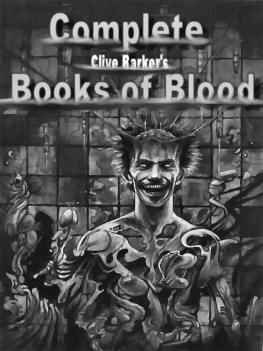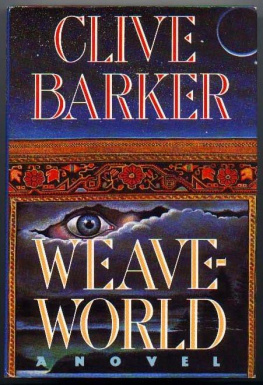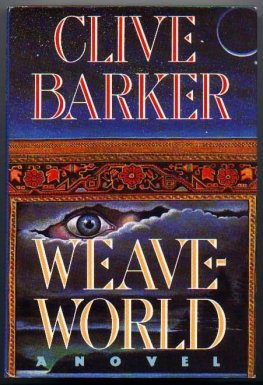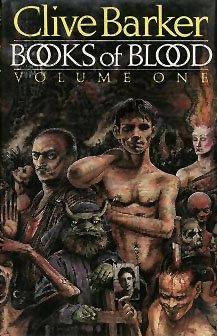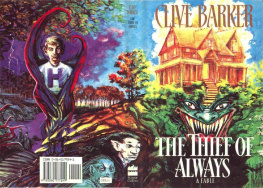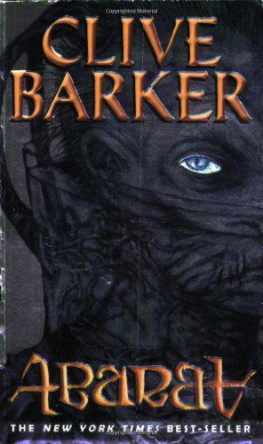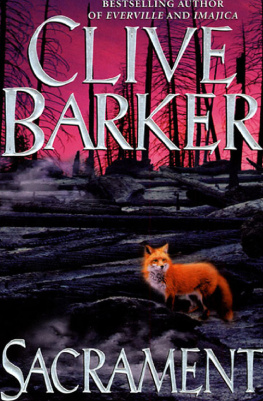Barker, Clive
The Great and Secret Show
PART ONE: THE MESSENGER
I
Homer opened the door.
"Come on in, Randolph. "
Jaffe hated the way he said Randolph, with the faintest trace of contempt in the word, as though he knew every damn crime Jaffe had ever committed, right from the first, the littlest.
"What are you waiting for?" Homer said, seeing Jaffe linger. "You've got work to do. The sooner it's started, the sooner I can find you more. "
Randolph stepped into the room. It was large, painted the same bilious yellow and battleship gray as every other office and corridor in the Omaha Central Post Office. Not that much of the walls was visible. Piled higher than head-height on every side was mail. Sacks, satchels, boxes and carts of it, spilling out onto the cold concrete floor.
"Dead letters, " Homer said. "Stuff even the good ol' U.S. Post Office can't deliver. Quite a sight, huh?"
Jaffe was agog, but he made sure not to show it. He made sure to show nothing, especially to wise guys like Homer.
"This is all yours, Randolph, " his superior said. "Your little corner of heaven. "
"What am I supposed to do with it?" Jaffe said.
"Sort it. Open it, look for any important stuff so we don't end up putting good money in the furnace. "
"There's money in them?"
"Some of "em," Homer said with a smirk. "Maybe. But most of it's just junk-mail. Stuff people don't want and just put back in the system. Some of it's had the wrong address put on and it's been flying backwards and forwards till it ends up in Nebraska. Don't ask me why, but whenever they don't know what to do with this shit they send it to Omaha."
"It's the middle of the country," Jaffe observed. "Gateway to the West. Or East. Depending on which way you're facing."
"Ain't the dead center," Homer countered. "But we still end up with all the crap. And it's all got to get sorted. By band. By you."
"All of it?" Jaffe said. What was in front of him was two weeks', three weeks', four weeks' work.
"ALL of it," said Homer, and didn't make any attempt to conceal his satisfaction. "All yours. You'll soon get the hang of it. If the envelope's got some kind of government marking, put it in the burn pile. Don't even bother to open it. Fuck 'em, right? But the rest, open. You never know what we're going to find." He grinned conspiratorially. "And what we find, we share," he said.
Jaffe had been working for the U.S. Post Office only nine days, but that was long enough, easily long enough, to know that a lot of mail was intercepted by its hired deliverers. Packets were razored open and their contents filched, checks were cashed, love-letters were laughed over.
"I'm going to be coming back in here on a regular basis," Homer warned. "So don't you try hiding anything from me. I got a nose for stuff. I know when there's bills in an envelope, and I know when there's a thief on the team. Hear me? I got a sixth sense. So don't you try anything clever, bud, 'cause me and the boys don't take kindly to that. And you want to be one of the team, don't you?" He put a wide, heavy hand on Jaffe's shoulder. "Share and share alike, right?"
"I hear," Jaffe said.
"Good," Homer replied. "So--" He opened his arms to the spectacle of piled sacks. "It's all yours." He sniffed, grinned and took his leave.
One of the team, Jaffe thought as the door clicked closed, was what he'd never be. Not that he was about to tell Homer that. He'd let the man patronize him; play the willing slave. But in his heart? In his heart, he had other plans, other ambitions. Problem was, he wasn't any closer to realizing those ambitions than he'd been at twenty. Now he was thirty-seven, going on thirty-eight. Not the kind of man women looked at more than once. Not the kind of character folks found exactly charismatic. Losing his hair the way his father had. Bald at forty, most likely. Bald, and wifeless, and not more than beer-change in his pocket because he'd never been able to hold down a job for more than a year, eighteen months at the outside, so he'd never risen higher than private in the ranks.
He tried not to think about it too hard, because when he did he began to get really itchy to do some harm, and a lot of the time it was harm done to himself. It would be so easy. A gun in the mouth, tickling the back of his throat. Over and done with. No note. No explanation. What would he write anyway? I'm killing myself because I didn't get to be King of the World? Ridiculous.
But...that was what he wanted to be. He'd never known how, he'd never even had a sniff of the way, but that was the ambition that had nagged him from the first. Other men rose from nothing, didn't they? Messiahs, presidents, movie stars. They pulled themselves up out of the mud the way the fishes had when they'd decided to go for a walk. Grown legs, breathed air, become more than what they'd been. If fucking fishes could do it, why couldn't he? But it had to be soon. Before he was forty. Before he was bald. Before he was dead, and gone, and no one to even remember him, except maybe as a nameless asshole who'd spent three weeks in the winter of 1969 in a room full of dead letters, opening orphaned mail looking for dollar bills. Some epitaph.
He sat down and looked at the task heaped before him.
"Fuck you," he said. Meaning Homer. Meaning the sheer volume of crap in front of him. But most of all, meaning himself.
At first, it was drudgery. Pure hell, day after day, going through the sacks.
The piles didn't seem to diminish. Indeed they were several times fed by a leering Homer, who led a trail of peons in with further satchels to swell the number.
First Jaffe sorted the interesting envelopes (bulky; rattling; perfumed) from dull; then the private correspondence from official, and the scrawl from the Palmer method. Those decisions made, he began opening the envelopes, in the first week with his fingers, till his fingers became calloused, thereafter with a short-bladed knife he bought especially for the purpose, digging out the contents like a pearl-fisher in search of a pearl, most of the time finding nothing, sometimes, as Homer had promised, finding money or a check, which he dutifully declared to his boss.
"You're good at this," Homer said after the second week. "You're really good. Maybe I should put you on this full time."
Randolph wanted to say fuck you, but he'd said that too many times to bosses who'd fired him the minute after, and he couldn't afford to lose this job: not with the rent to pay and heating his one-room apartment costing a damn fortune while the snow continued to fall. Besides, something was happening to him while he passed the solitary hours in the Dead Letter Room, something it took him to the end of the third week to begin to enjoy, and the end of the fifth to comprehend.
He was sitting at the crossroads of America.
Homer had been right. Omaha, Nebraska, wasn't the geographical center of the USA, but as far as the Post Office was concerned, it may as well have been.
The lines of communication crossed, and recrossed, and finally dropped their orphans here, because nobody in any other state wanted them. These letters had been sent from coast to coast looking for someone to open them, and had found no takers. Finally they'd ended with him: with Randolph Ernest Jaffe, a balding nobody with ambitions never spoken and rage not expressed, whose little knife slit them, and little eyes scanned them, and who--sitting at his crossroads--began to see the private face of the nation.
There were love-letters, hate-letters, ransom notes, pleadings, sheets on which men had drawn round their hard-ons, valentines of pubic hair, blackmail by wives, journalists, hustlers, lawyers and senators, junk-mail and suicide notes, lost novels, chain letters, resumes, undelivered gifts, rejected gifts, letters sent out into the wilderness like bottles from an island, in the hope of finding help, poems, threats and recipes. So much. But these many were the least of it. Though sometimes the love-letters got him sweaty, and the ransom notes made him wonder if, having gone unanswered, their senders had murdered their hostages, the stories of, love and death they told touched him only fleetingly. Far more persuasive, far more moving, was another story, which could not be articulated so easily.
Next page


